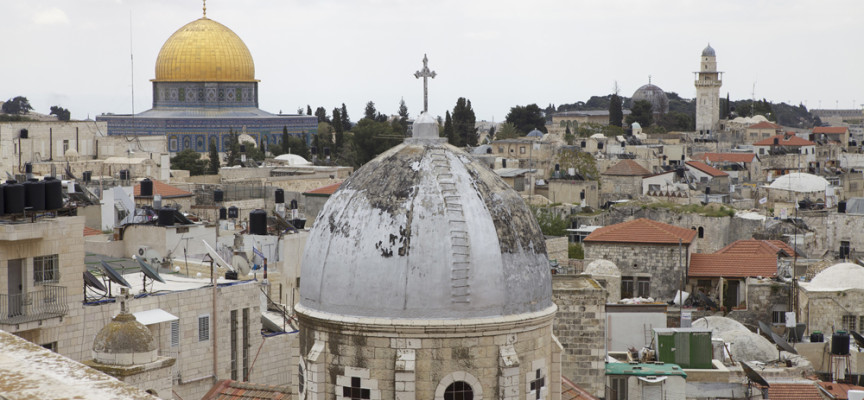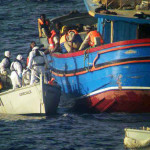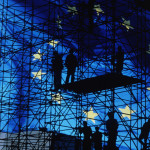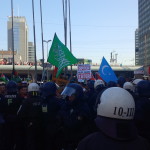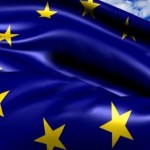The one we have seen at mid-July was a “great investiture scenario”: Federica Mogherini, Foreign Minister of Italy, now in charge of the rotating chairmanship of the EU, on a visit to Israel and Palestine a few days after the beginning of the “Shelling” military operation. Meanwhile, in Brussels, the Heads of State and Government, after the appointment of Jean-Claude Juncker as President of the EU Commission, were working on an agreement on the other key chairs. That July 17 could have been the day of the appointment of the Italian Foreign Minister as the High Representative for the Common Foreign and Security Policy (CFSP) of the EU. This hypothesis is now frozen, but not yet passed.
A coincidence that had the merit of immediately facing the EU with the inextricable Arab-Palestinian issue and its own neighbourhood policy in the whole Mediterranean area. A debut of Italian quarter, whoever will be the next Mr CFSP, which powerfully challenges the responsibilities of European foreign policy.
The Egypt’s proposal for a ceasefire and the return of U.S. Secretary of State John Kerry as a great mediator in the region – these were some timid developments of international diplomacy. Since the beginning of the Gaza crisis other actors have appeared between Jerusalem and Ramallah, but with Egypt struggling with its post-Mubarak crises of identity, no regional power can really play a decisive role. The prudence of Washington since the beginning of the Arab Spring, as well as during the UN raids in Libya, Syria, and Iraq, is a sign that the Southern Mediterranean area is no longer a “political frontier” for them. The “grudging” return to the Middle East of John Kerry, disappointed after more than two years of futile shuttle diplomacy between Jerusalem and Ramallah in a vain attempt to reopen the peace process, looks like a sort of temporary substitute for the absence of other powers capable of creating a new equilibrium, in the aim of holding back violence and the risk of destabilization.
A paradox. If there is a crisis that affects and worries Brussels much more than Washington, this is the Gaza crisis. Obviously Europe has vital interests in the region, for clear historical, economic, energy supply, and security reasons. This awareness was demonstrated by the cogent commitment of the EU with the Gaza Strip in terms of economic cooperation. Suffice it to remind to the easy detractors of Brussels that the European Commission is the highest donor to the Palestinians, with a program that in 2011 has disbursed loans amounting to 459 million Euro. On July 1st, an agreement of assistance in the education and training of Palestinian police was renewed. A considerable effort that is part of the more general Barcelona Process to the benefit of the whole Mediterranean area. Vice versa, a possible geopolitical leverage able to surpass Israel’s isolation syndrome in an Arab world affected by sinister Jihadic waves, is the partnership project – soon to become an associative project – between Israel and the EU.
Following and reinforcing these insights seems to be one of the few concrete points in a time when calls for peace and the condemnation of violence are eventually shattered against the global inability to break the cycle of hate between Israel and Palestine. Not to mention the inertia of a Europe without foreign policy.
But this is the point: to create stability and security between NPA and Israel and throughout the Mediterranean area, we need a Europe with its own foreign policy, not 28 ministers in random order. This cannot be the outcome of the activism of a few individual leaders, but the result of a transfer of sovereignty and a revision of the treaties in the name of the Twenty-eight. An ideal boost by a rotation chairmanship which is geographically very close to the Middle East could emphasize what is already a pressing need. This Mare Nostrum, as well as a common immigration policy and a greater commitment of the Twenty-eight to patrol their own coasts through Frontex, calls for redesigning a common foreign policy.
Era uno “scenario” da grande investitura quello di metà luglio: Federica Mogherini ministro degli Esteri dell’Italia, presidente di turno Ue, in visita in Israele e Palestina pochi giorni dopo l’inizio dell’operazione militare Margine protettivo. Intanto a Bruxelles i capi di stato e di governo, dopo la designazione di Jean Claude Juncker a presidente della Commissione, cercavano l’intesa sulle altre poltrone chiave dell’Unione Europea. Poteva essere, quel 17 luglio, il giorno della designazione del ministro degli Esteri italiano ad Alto rappresentante della politica estera e sicurezza dell’Ue. Un’ipotesi per ora congelata, non ancora tramontata.
Una coincidenza che ha avuto il merito di mettere subito a confronto l’Unione Europea con l’inestricabile questione arabo-palestinese e con la politica di vicinato nell’intera area del Mediterraneo. Un esordio di semestre italiano, chiunque sarà il prossimo Mr Pesc, che interpella con forza le responsabilità della politica estera europea.
La proposta di un cessate il fuoco egiziano e il ritorno come grande mediatore nella regione del segretario di Stato Usa John Kerry sono i timidi sviluppi della diplomazia internazionale. Dall’inizio della crisi di Gaza altri attori sono comparsi tra Gerusalemme e Ramallah ma, con l’Egitto alle prese con le crisi identitarie provocate del dopo-Mubarak, nessuna vera potenza regionale è in grado di giocare un ruolo decisivo. La prudenza di Washington dall’inizio delle primavere arabe, durante i raid Onu in Libia, in Siria e in Iraq poi, dimostrano come quella a sud del Mediterraneo non sia più per Washington una “frontiera politica”. Il ritorno di Kerry in Medio Oriente “obtorto collo”, deluso da oltre due anni di inutile spola diplomatica tra Gerusalemme e Ramallah nel vano tentativo di riaprire il processo di pace, pare una sorta di supplenza all’assenza di altri potenze in grado di creare un nuovo equilibrio capace di arginare la violenza e i rischi di destabilizzazione.
Un paradosso. Se esiste una crisi che interessa e preoccupa Bruxelles molto più che Washington è quella di Gaza. Ovvio dire che l’Europa ha, per evidenti ragioni storiche, economiche, di approvvigionamento energetico e di sicurezza, interessi vitali nella regione. Una consapevolezza dimostrata da un forte impegno di cooperazione economica dell’Ue con la Striscia di Gaza. Basti ricordare, ai facili detrattori di Bruxelles, che la Commissione europea è il massimo donatore verso i palestinesi con un programma che nel 2011 ha erogato finanziamenti pari a 459 milioni di euro. Il primo luglio scorso è stato rinnovato un accordo di assistenza nella formazione e addestramento della polizia palestinese. Un impegno considerevole che s’inscrive nel più generale processo di Barcellona a favore di tutta l’area del Mediterraneo. Una possibile leva geopolitica in grado di far superare a Israele la sindrome da isolamento in un mondo arabo attraversato da sinistre folate jihadiste, è invece il progetto di un partenariato e poi di un’associazione tra Israele e Ue.
Proseguire e potenziare queste intuizioni pare essere uno dei pochi spunti di concretezza in un’ora in cui gli appelli alla pace e la condanna della violenza si vanno a infrangere sull’incapacità mondiale di spezzare la spirale d’odio israelo-palestinese. E con l’inerzia di un’Europa senza politica estera.
Ma questo è il punto: per creare stabilità e sicurezza fra Anp e Israele e in tutta l’area del Mediterraneo serve un’Europa che abbia una politica estera, e non Ventotto ministri in ordine sparso. Questo non potrà essere il risultato dell’attivismo di qualche singolo leader, ma il frutto di una cessione di sovranità e di una revisione dei trattati in nome dei Ventotto. La spinta ideale di una presidenza di turno molto vicina geograficamente al Medio Oriente potrebbe rendere evidente quella che è una stringente necessità. Il Mare nostrum, oltre che una politica dell’immigrazione comunitaria e un maggior impegno dei Ventotto attraverso Frontex per pattugliare le coste, impone di iniziare a riprogettare una politica estera comune.
Luca Geronico
giornalista, Avvenire (Italia)
Latest posts by Luca Geronico (see all)
- Twenty-eight scattered voices - 27 luglio 2014

